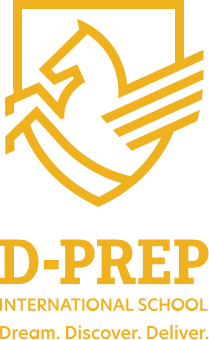FAQ
Frequently Asked Questions
D-PREP is affiliated with ASB in that Ms. Lady Didyasarin Tavedikul, the head of school, is a School Director and also a board member of the American School of Bangkok. There are joint school events during the school year.
D-PREP is different in that we use the innovative D-PREP PBL (passion + problem + practice + project based learning) as the main teaching and learning approach. D-PREP follows a combination of American (New York State Curriculum) and Canadian curriculum (Ontario) while ASB follows a fully American curriculum (common core). We also plan to be an International Baccalaureate (IB) school while ASB is a WASC accredited school that offers the AP program in high school.
At D-PREP, as stated previously, we follow the D-PREP PBL teaching and learning model and incorporate a D-PREP life skills curriculum into the regular program. For the social studies curriculum, we focus priority on the Thai, Asian, and international culture and history because we are located in Thailand.
Our curriculum offers an emphasis on 3 languages. 70% of all study time is allocated to developing English skills, 20% to the Thai language, and 10% to the Chinese language.
Our curriculum offers an emphasis on 3 languages. 70% of all study time is allocated to developing English skills, 20% to the Thai language, and 10% to the Chinese language.
Our teachers are mainly American, Canadian, British, South African, Thai, Chinese.
Our students are mainly Thai, Taiwanese, Chinese, Korean, American , British, German, Swedish, Norwegian and some of the European countries
All our homeroom teachers are native English speakers who possess teaching qualifications approved by international education institutions (WASC or CIS) such as a a Bachelor’s / Master’s degree in education or a PCGEi teaching qualification.
Nursery 1- 2: 12-15 students ,
Kindergarten 1-2 : 15-18 students ,
Grades 1-5 : 20-22 students
There is absolutely no problem even if no family member speaks English at home. Children spend all day every school day learning in English. The first few months will be the process of developing understanding of English vocabulary and phrases. Children will start to verbalize English words when they feel ready. If students attend our school since Nursery 1, by Nursery 2 they will pronounce words correctly and speak fluently in simple sentences by K-1. By K-2, they are able to express their thoughts and ask questions in more complex sentences. They will soon learn to use English at school and Thai at home.
We always encourage parents to speak English to their children regardless of their English ability. Many parents have been instructed not to out of fear that their children will adopt their wrong accent or broken grammar. Children are really intelligent. They know that their teachers at school are the English speakers they need to learn and copy from. They will eventually come back and correct their parents on how to use the right grammar or pronounce correctly. Attempting to speak to them in English shows that you value the English language and will make them want to show off their English skills at home.
If the child enrolls in the Nursery-Kindergarten 2, there will normally be a smooth transition into our international school program as children at this age adjust very quickly in a new environment. Some extra tutoring after school may be needed at the K-2 level if the child shows that he/she is struggling and unable to follow the regular expectations after a few months into school.
If the child enrolls in Grade 1 and above from a Thai school, he/she will have to take the English placement test to determine the ability of English in comparison to our elementary English ability expectations. If the child lacks sufficient knowledge in English, he/she will be required to enroll in the ELL program where he/she will be pulled out during the literacy subject to learn directly with an ELL specialist. Once the child is able to catch up to the minimum required English ability through passed evaluation, he/she will be placed back to join the grade’s regular literacy class.
If the child enrolls in Grade 1 and above from a Thai school, he/she will have to take the English placement test to determine the ability of English in comparison to our elementary English ability expectations. If the child lacks sufficient knowledge in English, he/she will be required to enroll in the ELL program where he/she will be pulled out during the literacy subject to learn directly with an ELL specialist. Once the child is able to catch up to the minimum required English ability through passed evaluation, he/she will be placed back to join the grade’s regular literacy class.
We follow an international and Thai food menu. All students are encouraged to eat as much as they want and to try all types of food offered at the school. Nursery-Kindergarten 1 students are served lunch and snack at the dining tables whereas K2 and above are expected to serve themselves to promote independence and self-regulation under adult supervision.
If any child has food allergies, this information should be given to the school at the time of application and we will ensure that all necessary adjustments will be made to meet the needs of that child.
Every morning we do a temperature check and hand sanitization for all students when they arrive at school. If any student measures more than 37.5 degrees celsius, the school will ask the parent to take him or her home. During the school day, if a student develops a fever over 37.5, severe diarrhea, excessive coughing or runny nose, or vomiting, parents will be called to come to pick up their child from school.


